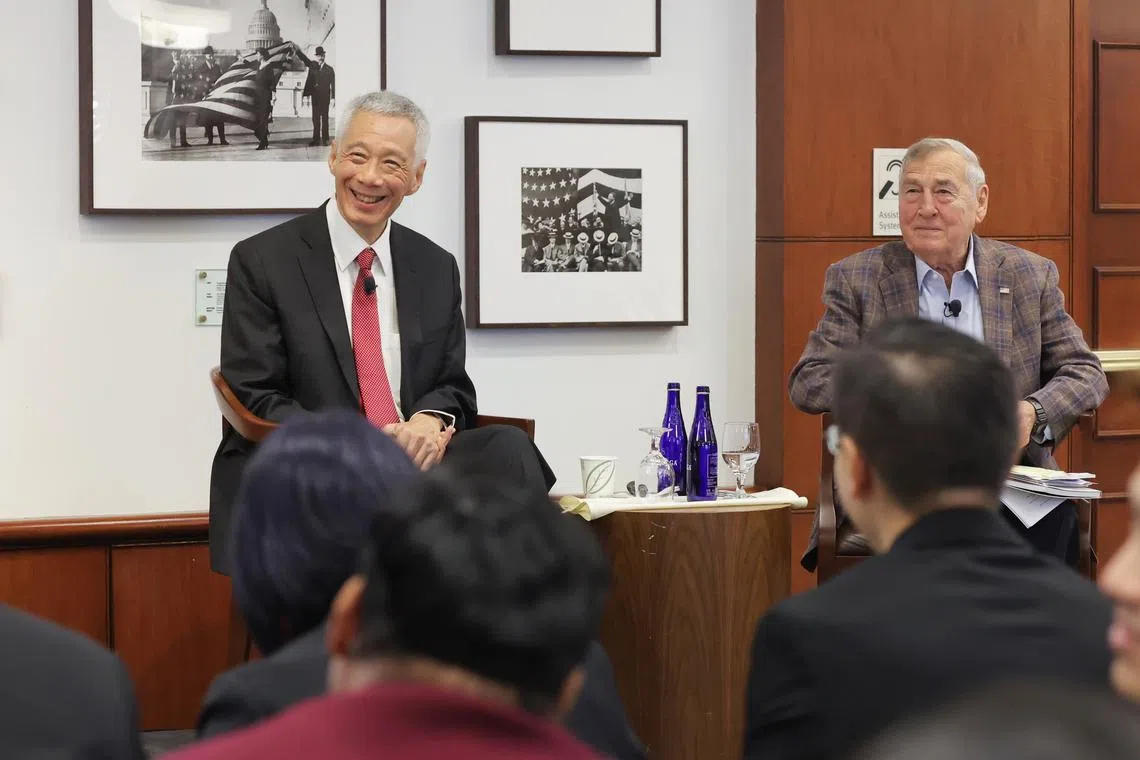Invest in what works instead of ‘buying insurance’ to keep Singapore successful: SM Lee
Sign up now: Get ST's newsletters delivered to your inbox

Senior Minister Lee Hsien Loong said Singapore was able to land on the right combination of politics and policy.
PHOTO: MDDI
Follow topic:
SINGAPORE – The path that Singapore took to get to where it is today started with fierce struggles against colonialism, communism and communalism, and this crucial factor in the country’s development cannot be easily replicated, said Senior Minister Lee Hsien Loong.
It was this experience that shaped the first generation of leaders and citizens who came together and worked hard to put Singapore on the path of success, he added.
“Because we have been able to build on that and maintain that, we have stayed in the Garden of Eden for more than one generation,” he said, referring to the biblical paradise where the first man and woman believed to have been created by God lived before they got expelled after tasting the forbidden fruit.
The way to remain in this ideal state is to continue investing in what works, he added.
“Between buying insurance in case you fall out of the Garden of Eden and investing in this so that it continues to work well, I say, do not spread your bets. Focus, make sure this works,” he said.
SM Lee was speaking on Nov 12 (Nov 13, Singapore time) at the Edwin L. Godkin Lecture. He also answered questions about governance during a moderated discussion at the Harvard Kennedy School in Boston, Massachusetts, during a working visit to the US.
In the 20-minute speech, he shared his insights on governance, touching on Singapore’s history and how it shaped the country’s trajectory.
Singapore first fought against its colonial master, Britain, and gained self-government, then full independence. This was followed by a big political battle over whether to have a left-wing pro-communist or democratic non-communist government.
The struggle against the communist threat then partly led to Singapore’s entry into a new Federation of Malaysia, but the fundamental differences between the ruling parties of Singapore and Malaysia on multiracialism and race-based politics eventually led to Singapore being expelled.
Recounting this “complicated” and “unnatural” birth of Singapore, SM Lee said things fortunately turned out well, and these circumstances established the founding ideals of Singapore: to be independent and sovereign; non-communist and democratic; and multiracial and meritocratic, with equal opportunities for all, regardless of race, language or religion.
But the battles could have easily gone either way, he added.
“That is why if others try to replicate our recipe, or even if we ourselves were to traverse all over again the same journey and hope to come here again, we may not end up in the same spot, so... we are path-dependent; the history matters,” he said.
Citing Singapore’s high-quality government, state institutions and public services, and economic growth, as well as social cohesion, SM Lee said Singapore was able to land on the right combination of politics and policy.
He said ministers do have to get re-elected, and because they know that this is more likely if they deliver results, they know the buck stops with them and have every incentive to deal with serious problems and not kick the can down the road.
He added that politics in Singapore is very different from that in other countries.
The pioneer generation of Singaporeans had gone through the crucible of fire with their political leaders and “understood that our backs are to the wall (and) we will make this work”, he said.
There was also one happenstance after Singapore became independent, when the left-wing opposition decided that it would declare it a sham and boycott Parliament, he said of the Barisan Sosialis.
“They vacated their seats, the PAP expanded, filled the whole space of politics, and therefore established dominance, which it has to be able to keep and make use of to good purpose now for more than half a century,” said SM Lee in response to a question on whether other countries can adapt the lessons Singapore has learnt.
“I do not know if you start on a nation-building process, you will have a good fortune to have such an outcome from big struggles, or to have an opponent which will make such a mistake.”
For more than 60 years, successive generations of People’s Action Party governments have performed well and delivered on their promises, he said.
“That is why Singaporeans have put their confidence in us, term after term, 15 times in a row so far,” he added.
This reservoir of trust widens the Government’s political and policy space, and enables it to think long term, as well as make politically difficult but essential decisions, he said.
For instance, raising consumption taxes
“Nothing prevents Singaporeans from voting the ruling party out if we breached their trust, let them down or fail to maintain the high standards that they have come to expect of us,” SM Lee added.
Over time, Singapore has evolved and adapted its democratic political system and norms to suit its circumstances, and this has worked for Singapore.
“The country is successful – there is high trust in government and society, we have rising incomes and standards of living, we have high-quality public services, stable politics, a strong international reputation, and a united, resolute people who stand together against the odds,” SM Lee added.
But this state of affairs is quite unusual, and staying on in this “Garden of Eden” state will require a good government, good policies and new generations of capable and committed leaders who will look after the population well, he said.
At the same time, there must be a common understanding of the realities that this stability and prosperity depend on, and what it takes to work together to keep the state going, he added.
SM Lee, who has cited the biblical analogy in past speeches to describe Singapore’s current state, said there is no guarantee that the country will continue to thrive since there is no secret formula that will work even for the next 50 years, let alone eternity.
He said: ‘If you break from this, and you go to become a normal country, you will have the problems which normal countries have, and you cannot come back to where you are again, ever.”
SM Lee, who stepped down as prime minister in May and handed over leadership to Mr Lawrence Wong,
He said that he was able to hand over the country stable and in good order, adding: “Now they have to do it and keep on doing in the same way.”
He noted that Singapore has gone through three top leadership transitions
“This year, a new prime minister took over from me, and I am very happy that the transition to Prime Minister Lawrence Wong has gone well, and I hope Singapore will continue renewing itself, and rejuvenating our national project, for many years to come.”


